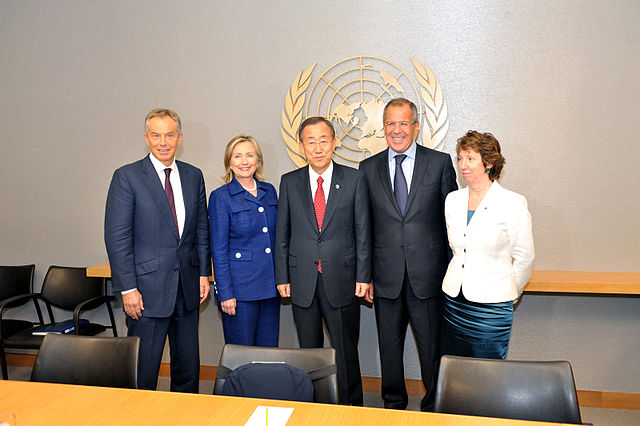UPDATES
The Mideast Quartet strikes a constructive note
April 12, 2012 | Ahron Shapiro

The Middle East Quartet (the US, UN, EU and Russia), which met in Washington on Wednesday, issued a statement on Middle East peacemaking following the meeting that is notable for its constructive tone.
Nearly half of the 690-word dispatch dealt with the Quartet’s efforts to shore up the Palestinian economy and nurture the Palestinian Authority’s state-building efforts in the sense of helping the PA provide for the wellbeing of its inhabitants.
Another quarter of the statement subtly increased pressure on the Palestinians to curb incitement and rein in violence against Israel, especially rocket attacks. At the same time, a proportionate amount of pressure was also applied on Israel to act against provocations by settlers.
Noting the significant progress on security achieved by the Palestinian Authority in the West Bank, the Quartet calls on the Palestinian Authority to continue to make every effort to improve law and order, to fight violent extremism, and to end incitement. The Quartet emphasized the need to continue assisting the Palestinian Authority in building its law enforcement capacity. The Quartet also expressed its concern over ongoing settler violence and incitement in the West Bank and calls on Israel to take effective measures, including bringing the perpetrators of such acts to justice.
The Quartet condemned rocket attacks from Gaza and stressed the need for calm and security for both peoples. The Quartet underscored the importance of continued steps to address the needs of Gaza’s residents, and welcomed the Israeli Government’s approval at the AHLC meeting of UN priority infrastructure projects in Gaza. Reaffirming its previous positions, the Quartet considers that the situation in and around Gaza remains fragile and unsustainable as long as the West Bank and Gaza are not reunited under the legitimate Palestinian Authority adhering to the PLO commitments.
The Quartet chose not to include any unusually strong statements about Israeli settlements in the West Bank, opting for a brief acknowledgement that suggests that while the issue remains on the Quartet’s policy agenda, the group seeks to avoid creating new excuses for the Palestinians to avoid returning to the negotiating table.
Reminding both parties of their obligations under the roadmap, the Quartet reiterated its call for them to avoid actions that undermine trust and to focus on positive efforts that can strengthen and improve the climate for a resumption of direct negotiations on the basis of the Quartet’s September 23 statement.
The Quartet expressed concern about unilateral and provocative actions by either party, including continued settlement activity, which cannot prejudge the outcome of negotiations, the only way to a just and durable solution to the conflict.
By following this route, the Quartet makes it clear it was not about to take the bait the PA had laid before it. On Monday, the Palestinian Authority launched a diplomatic offensive at the UN to seek censure of Israel for recent announcements on the issue of settlements and housing in east Jerusalem.
Most recently, Israel’s housing ministry on April 4 published routine tenders for new construction in the southern Jerusalem neighbourhood of Har Homa as well as in Givat Ze’ev, a suburb located a few kilometres north of Jerusalem’s municipal boundaries. The same day, Israeli PM Binyamin Netanyahu made a statement to cabinet colleagues about exploring legal avenues for legalising three illegally constructed West Bank outposts on state land and avoiding the evacuation of a settlement neighbourhood built on land Palestinians claim was improperly purchased. (This was seen by most Israel commentators as a political trade off for the forced evacuation of settlers from a house in Hebron they claimed to have legally purchased a few days previously).
Beyond the UN, the AFP reported on the significance of the timing of the PA’s diplomatic response:
“[Palestinian Foreign Minister Riyad al-Malki] said the Palestinians would seek a Quartet statement ‘that clearly says that the continuation of settlements is the main obstacle to the revival of real and serious negotiations.'”
In their statement on Wednesday, the Quartet resoundingly rejected this demand, which would have led only to yet more of the stagnation in the peace talks that has predominated since 2009.
However, the Palestinian call for Israel’s censure did not go entirely unheeded. On April 10, Norway’s Foreign Minister Jonas Gahr Støre harshly criticised Israel on the settlement issue.
In contrast, the UK’s Foreign Minister William Hague did not wait for Palestinian prompting and criticised Israel back on April 5, shortly after the story broke, while the US State Department has remained mum on the issue.
Meanwhile, Australian Foreign Minister Bob Carr, who was visiting the UN on April 10, issued a statement that, like the Quartet, urged the Israelis and Palestinians back to the peace table, but, in contrast to the Quartet statement, also focused significantly on condemning the Jerusalem tenders and settlements as well as Netanyahu’s statement six days prior.
Ahron Shapiro
Tags: Palestinians





